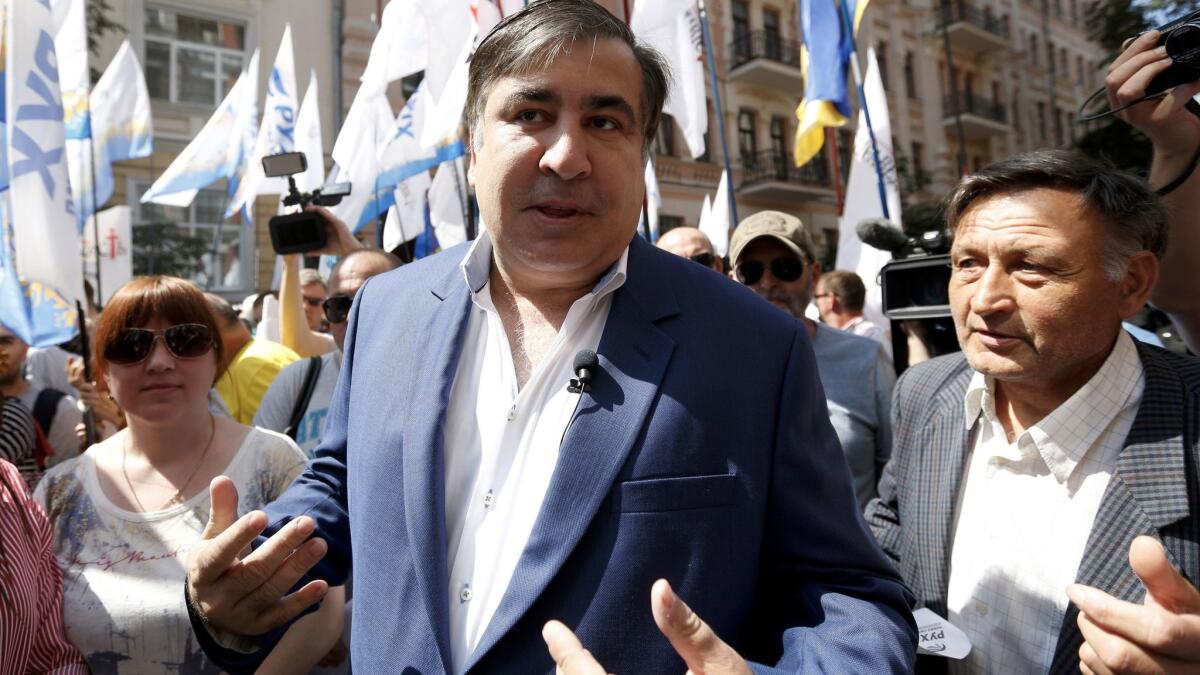Ukraine strips Saakashvili of his citizenship, leaving the hero of the Rose Revolution without a country

- Share via
Reporting from Moscow — There was a time when Mikheil Saakashvili was seen as the West’s great hope for reform in the former Soviet Union.
But since Thursday, he has had a more pressing problem: He is a man without a country.
He was in New York when he learned that Ukraine, his adoptive home, had stripped him of his citizenship. He had already lost his citizenship in his native Georgia, where he was once president.
“I have only one citizenship, that of Ukraine, and I will not be deprived of it,” he said Friday, vowing to return to the country — where until last year he had been the governor of the southern port city of Odessa — and mobilize his supporters.
The Ukrainian migration service said in a statement that the decision was made after it was discovered that Saakashvili had supplied false information about pending corruption charges in Georgia when he filed citizen registration papers in 2015.
But Saakashvili, who has said the charges in Georgia are politically motivated, blamed Ukrainian President Petro Poroshenko for the decision to leave him stateless.
“Poroshenko decided to deprive me of my citizenship in an underhanded way, while I am out of the country!” Saakashvili wrote on his Facebook page.
Saakashvili, 49, was born in Georgia and went on to lead the country in a bloodless Rose Revolution to overthrow a Soviet-era president in 2003. He was elected president the next year and earned a reputation for implementing reforms in Georgia that forced out criminal gangs and corruption.
During his second term, Saakashvili fell out of favor as critics accused him of consolidating his power. He fled the country in 2013, did a stint as a professor at Tufts University in Boston and eventually landed in Ukraine, where the post-Soviet nation was undergoing its own revolution.
Mass street demonstrations in Kiev, Ukraine’s capital, led to the 2014 ousting of Kremlin-favored President Viktor Yanukovich, who is currently on trial in absentia on corruption-related charges. Russia, angered by pro-Western popular revolt in Ukraine, annexed Crimea in 2014. A war with pro-Russia separatist militias in eastern Ukraine followed.
Poroshenko, who was elected Ukraine’s president in 2014, invited the Western-educated Saakashvili to become the governor of Odessa, where corruption and criminal gangs were notorious. The two men had been university classmates in Kiev.
Poroshenko granted him Ukrainian citizenship in 2015, prompting Georgia to take away his citizenship.
As Odessa governor, Saakashvili soon ran up against Ukraine’s entrenched oligarchies, which pushed back on his attempts to break up monopolies.
Saakashvili blamed the government in Kiev for stalling on reforms that were both needed to move the country out of its post-Soviet haze and required by international donors, who were banking on Ukraine’s pro-Western stance.
Saakashvili announced he was resigning as Odessa governor in November in a fiery speech in which he accused Poroshenko of dishonesty and Ukraine’s central government of sabotaging his efforts to implement crucial reforms.
“How much can you lie and cheat?” Saakashvili, looking straight into news cameras, asked the Ukrainian president.
Saakashvili proceeded to start his own political movement of people who opposed Poroshenko’s ruling party and advocated for Western standards of rule of law and democracy.
Still, current opinion polls show popular support for Saakashvili’s movement at less than 2%.
Saakashvili said the Ukrainian government’s move to strip his citizenship is part of a worrying trend in Ukraine.
“I am being subjected to the same approaches that are used by Ukraine’s prosecutors or bureaucrats against regular Ukrainians, whose rights are spat upon,” Saakashvili said in a video posted on his Facebook page.
Balazs Jarabik, a nonresident scholar at the Carnegie Endowment for International Peace, said that by eliminating Saakashvili as an opposition force, Poroshenko is narrowing the competition ahead of the 2019 presidential election.
“What Poroshenko is doing is consolidating his power to make sure he is reelected,” he said.
A recent opinion poll showed that only 11.6% of voters support Poroshenko, whose office declined to comment Friday.
Though the United States and European leaders have thrown their support behind the democratic and economic reforms Ukraine promised after the 2014 revolt, change has been frustratingly slow for Ukrainians. The average monthly salary still hovers around $263. Corruption still permeates Ukrainian bureaucracy, and oligarchs still dominate the ruling elite.
Poroshenko, himself a tycoon in the candy industry, has blamed the slow progress on the ongoing war in the east, which has claimed more than 10,000 lives, and Russian aggression against Ukraine.
The European Union recently granted visa-free travel to Ukrainians in what many saw as a sign of good faith that Ukraine was committed to democracy.
So far, the West has remained silent on Saakashvili losing his citizenship.
Sergei Solodkyy, an expert on international affairs at the World Policy Institute, a think tank in Kiev, said the move will be seen as a “gift” to Russian President Vladimir Putin and his government, which has had an extremely contentious relationship with Saakashvili since 2008, when Russia sent troops to back a revolt in northern Georgia.
Saakashvili has been a fierce critic of Putin’s autocratic style of governing.
“Putin was afraid that this virus of democracy would come into Russia [and] would destroy the regime of Putin,” Solodkyy said.
Twitter: @sabraayres
Ayres is a special correspondent.
More to Read
Sign up for Essential California
The most important California stories and recommendations in your inbox every morning.
You may occasionally receive promotional content from the Los Angeles Times.











